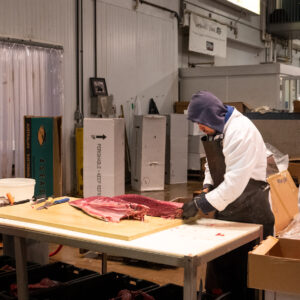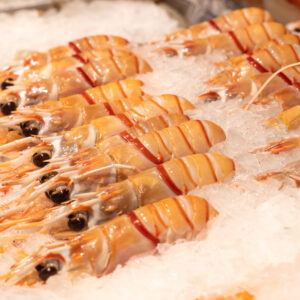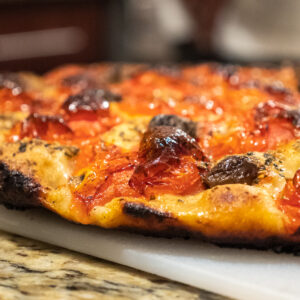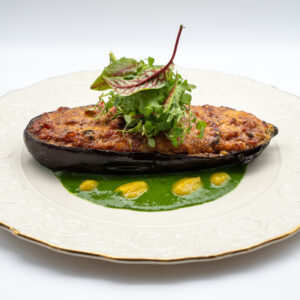On a recent Saturday, I met with Pasquale Martinelli, Personal Chef and founder of Alloro Private Culinary Concierge–New York City and Italy, at the Union Square Greenmarket in New York City to chat about his Italian roots, Italian cuisine in general and Apulian cuisine in particular, and the food industry in New York City in the midst of the Covid-19 pandemic. All topics that fascinate not only me, but a good percentage of the general population, whether just because we enjoy eating or we delight in flexing our muscles in the kitchen as home chefs.

Pasquale was born in Mola di Bari and came to New York in 2000. He at once felt right at home in the Big Apple and thought he had found his place. He decided to remain here permanently. Since then, he has become one of the leaders in the field of concierge cuisine in NYC.
Chef Pasquale has a solid professional background in the hospitality business. He trained at the hotel management school at Castellana Grotte, did a stint on cruise ships and ended up in the UK for a while, serving even Queen Elizabeth and Prince Charles.

Born into a family of farmers, Pasquale grew up close to the land and is brimming with respect for nature and its wonderful gifts, a reverence that is clearly visible in his love for natural and authentic ingredients. Indeed, Pasquale does his utmost to obtain as many ingredients as possible from Italy, through his New York purveyors. Even his kitchen tools and equipment are authentically Italian. What defines Pasquale’s approach to cooking and entertaining? This is one of the things that I wanted to find out.
By now we’ve all heard of the “Restaurant apocalypse”. This was already the cry to describe the dismal situation of the restaurant sector in New York City before Covid-19 and I wrote about it in a previous article. But if we thought that things were bad before Covid-19, right now we would need an even stronger word than apocalypse–if one existed– to signal the devastation brought by the lockdown made necessary by pandemic. The prediction is that as much as 75% of restaurants in New York City will have to shut down permanently. We have no trouble believing this as we walk around the city and notice how many establishments are already closed.

Yet, in the midst of this chaos and devastation, there is a bright spot in the hospitality business that most people are unaware of: the personal chef and catering business are alive and thriving. We’re here with Chef Pasquale Martinelli to find out more about this good news.
I know that you’re a passionate promoter of cuisine from Puglia. But Italian cuisine in general is world-renowned for the quality of its ingredients and the cook’s respect for them. So, what distinguishes it from the cuisines of the neighboring regions, for example?
“Once, at the Culinary Institute of America, someone asked me what’s the difference between being an Italian Chef in the USA and being an Italian chef in Italy. The answer is that “here in the USA we are the chefs, whereas in Italy we are all sous chefs because God is the ‘executive chef’” in terms of the extraordinary quality of the ingredients, and this means that we don’t need to apply long and complex cooking techniques. For example, eating produce, or a fruit in Italy, is different than eating them here, and mainly because the regional cuisine strictly follows the seasons and therefore 90% of it is organic or often wild. We eat figs when they ripen, or we wait for the cold pressed olives in the months of October, November and December to just enjoy a great piece of rustic artisan bread drowned in extra virgin olive oil as a snack.”
You have previously mentioned “La nonna” as a symbol of Italian hospitality. Tell us more about that.
“My idea of hospitality is emulating the old-style Sunday dinner experience in Italy; the kind we associate with our nonnas. Good simple food, authentic to our roots, prepared with passion and respect for the ingredients.”

Italian cuisine is among the most loved in the US and probably world-wide, but it’s mostly the red sauce variety. Yet Italian cuisine is much more than red sauce. Do you think this limits the image of Italian cuisine?
“This idea of associating Italian cuisine with red sauce is the result of the post-WWII wave of southern Italian immigrants who were not necessarily restaurateurs or hospitality professionals, although hard working people, who saw the restaurant world as an opportunity to make money by proposing homemade dishes from back home; and tomato sauce was and still is, an ‘easy way’ for a quick meal. Besides which, it was much appreciated by the average American consumer, but it is a big mistake to narrow down to ‘just red sauce’ an immense culinary heritage like the Italian culinary culture.”
If you had a magic wand, what would be your wish for Italian cuisine in America?
“‘Pane e Olio’, freshly baked bread using wild yeast and the most natural biological semolas from century-old mills; extra virgin olive oil made from millennial olive trees; tell the beautiful stories which hide behind these old generations of producers back in Puglia as in my case, but otherwise from all over Italy. Our cuisine is simple, made of the greatness of the ingredients, but most importantly these ingredients are created by artisans, shepherds, fishermen and farmers with a very unique ‘DNA’ that is connected exclusively to their land. These stories deserve to be told whenever we, as hospitality professionals, get to serve certain dishes. I like to tell those stories because I want my guests to not only eat the food, but take a piece of the culture with them when they go home so it becomes more a unique dinner experience and not ‘just a great meal’.”

Let’s talk a bit about your services as personal chef and catering. First, what is the difference between the two?
“The main difference is that a personal chef service like mine aims to have the guests experience an authentic Italian dinner, exactly as if they were invited on Sunday by an Italian family back in Italy. I design a menu according to the guest’s ‘food orientations’ and then I do the food shopping around NYC’s organic markets and/or import ingredients straight from Puglia. In addition I bake bread right on the premises using my own wild yeast, I make the traditional Pugliese focaccia following recipes from one of the oldest bakeries in Bari, Vecchio Forno Fiore, and I make fresh pastas from scratch. This is because I love to emulate a real Sunday morning back in Italy where the massaie make everything from scratch and the house smells of fresh ragù and fresh breads, and everyone comes together at the dinner table and experiences what is almost a ‘treatment for the guest’s soul’; exactly like it would be going to a spa for a ‘massage treatment’. Yes, I believe our way of enjoying a long and slow paced dinner is a great way to take care of our souls, it regenerates us, especially if there’s good wine. When Jesus broke his bread and shared the wine with his disciples it was done at a dinner table and he told us to stop working on Sunday. A catering service, on the other hand, is more ‘a food delivery’ with pre-made food to be either finished off on premises and/or re-warmed and served by waiters. The two experiences are totally different.”

What kind of dining experience are your clients generally looking for?
“It’s all about the same principle: I stand firmly for HOSPITALITY. It’s the same for everyone, regardless of their status, hospitality for me is to put my guests and their needs before anything else. Whether I’m making a 5-course dinner with champagne, or a sandwich, it’s all about hospitality, kindness, selflessness, generosity, and big huge smiles.”
What are the advantages of engaging a personal chef to host a dinner party as opposed to taking your guests to a restaurant?
“The advantages are, one above all, that we go to our guest’s home and we bring ‘a restaurant set up’ so you don’t have to travel and look for parking, wait for the table if it’s not ready; you don’t have a time frame for your dinner, because there’s no pressure on the part of the restaurant to free the table for the next reservation. What’s more, you can buy your favorite wines directly from the vineyard and pay a lot less than the restaurant markup. We can design a menu that fits exactly your and your guest’s needs in terms of possible allergies and/or food orientations. You can tell us ‘we don’t like red meat’, or, ‘we love red meat, we love vegetables and we are not crazy about shellfish’ and so forth and also, we provide the after-dinner cleaning services so you don’t have to worry about the mess. A bottle of water will cost you only a dollar as opposed to 10 or 15 plus tax and gratuities at a restaurant which often is a total rip off and not fair.”

What happens if your client doesn’t have a well-equipped kitchen?
“That really doesn’t matter to me. During my preliminary talks with the client I learn about the kind of meal they want and where they will want it served. Is it in their home? On a beach? Whatever. For the rest, as long as they have a basic kitchen, I’m okay. For me it’s more about the quality of the ingredients and my techniques. That’s all I need to create a memorable dining experience.”
How does the cost of a dinner party catered by you compare to hosting it in a restaurant?
“My dinners are inclusive of kitchen and front of the house professionals such as servers, captains, sommeliers, bartenders and Maître D’, along with the high-quality ingredients. They vary from $250 to $650 per person depending on the menu selections, how many courses you order, and if there are any ‘super expensive’ items such as caviar and truffles.”
What does a typical day look like for you as a personal chef?
“Well, there is no one typical day because given the nature of my dinner, where every menu is crafted to the guest’s needs, it takes more than one day. Beginning from finalizing the menu choices to the in-person food shopping which can take up to 1 or 2 days to complete, I would say that each dinner takes about 25 hours from the very beginning to the very end. I may drive to the Bronx fish market early in the morning if there’s fish on the menu then drop it off to refrigerate, and then go for produce at the Union Square Farmer’s Market, Just the driving takes up to a few hours. Two days before, I prep anything that can be prepped in advance without compromising the freshness of the final dishes, and this takes up to at least half a day if the dinner is for 8 to 10 guests. Then the day of the event we get on premises 3 hours before service starts and the dinner itself takes about 3 to 4 hours. After that we perform the thorough clean up services.”

Do you have a team that helps you during your dinner events?
“I love to give credit and exposure to some of my team players and this is because they are young and I want to support them in their careers to achieve their personal and professional success. I do have a few team players who periodically help me for my dinners and especially because the number of the guest changes each time. I’m lucky to rely on the help of my kitchen right hand man, Chef Gigi Rana. He too is from Puglia. Together we engineer new recipes, new food concepts and, ultimately, how the final presentations will be executed once we get on the premises, and this is because every house or venue we go too has different kitchen equipment and we must ‘study’ not only the taste of the dish itself but also the functionality of the final execution.”
How do you think the restaurant sector will develop as the Covid-19 goes on? Will it ever recover? Or get worse?
“I can speak for the New York market being familiar with it, and all I can say is that unfortunately, some will not survive. Yet New York is the kind of city where new ideas and new projects come to live after something ‘dies’ and at this specific time we may possibly see a ‘revolution’ or a ‘re-invention’ in the hospitality world.”
Pasquale, my last question is the one all our readers want to ask you: who does the cooking in your home?
“Ah well, I do! And I present my wife and daughter with menu choices every day. They’re mostly happy with the results but they do sometimes send complaints to ‘the chef’: me! I’m thinking of charging them a fee.”
Wow, it sounds like they have a pretty sweet deal! Can I come live with you all?
To contact Chef Pasquale Martinelli visit: moc.gninidetavirporolla@fehc












